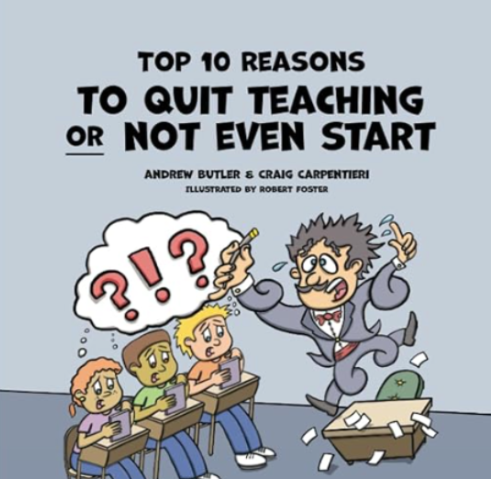Here at Scheck Hillel, the faculty never ceases to amaze us. Each staff member works hard in and out of the classroom to produce remarkable accomplishments in their field of interest, exemplifying Hillel’s unparalleled reputation. Two faculty members in particular – English Department Chair Andrew Butler and Chief Academic Officer Craig Carpentieri – have penned and published their own highly-praised works in the last year. These are achievements that ought not to be overlooked. The two collaborated on the coffee table book Top 10 Reasons to Quit Teaching or Not Even Start, and Butler individually wrote and published the fiction novel Surveillance School. In an exclusive interview, the authors gave some insight into their literary journey.
Here’s a question: Why teach? Through their fun and informative book, Top 10 Reasons to Quit Teaching or Not Even Start (aimed towards people of all ages), co-authors Andrew Butler and Craig Carpentieri answer this question by drawing from their years of experience, expressing both their struggles and triumphs in teaching. As the title suggests, the writers present ten reasons for one to avoid teaching as much as possible. However, if one takes the time to read through the book, they are hit with some meaningful motivation. The book opens by recounting the adventures that each author (as well as the illustrator, Robert Foster,) took to fulfill their aspirations of becoming teachers, even though they had never envisioned themselves pursuing a career in education. The book then discusses the negative aspects of teaching before moving on to the positive ones, illuminating the difficult and rewarding realities of being a teacher. When interviewed, Butler stated: “You’ll notice from the title of the book that it’s sort of negative. Reasons to quit teaching. It’s a sarcastic negative, in the sense that it is a book about why we love being teachers, not why we want to quit.”
The book highlights how crucial it is to dedicate oneself to teaching. Those who choose to follow this path should anticipate being humbled and, at times, overwhelmed. They should expect to experience many changes throughout their career. Butler responded to the question “What should readers take away from this book?” by explaining that while some readers may wonder what exactly is so fantastic about teaching, they should “realize that the teachers in their lives are heroes.” Earlier on, Carpentieri stated that he and Butler were inspired to develop and publish this book in part by their shared passion for teaching and to “honor those who spend every day doing the absolute best that they can for kids and honor what it is that they do.” To accomplish this goal, the co-authors decided that a staggering 70% of the proceeds from the sale of this book would go toward rewarding the best teachers on our campus. “A teacher can change a life, really, in a positive way and in a negative way,” the authors said. “You can have good teachers, bad teachers, and those in between, but when you have those good teachers, it’s important that they are recognized.”
In our conversation with Mr. Butler – the mind behind Surveillance School – we had the privilege of digging into the intricacies of his thought-provoking book. Surveillance School is an engaging narrative that follows the journey of William Wilbur, a scholarship recipient at the esteemed Snyder School of Excellence. The story unfolds in an environment saturated with classroom surveillance, where Will struggles to acclimate and navigate the challenges of forging friendships and excelling academically. The plot takes a turn when anonymous posts begin to surface, showcasing embarrassing classroom incidents and thrusting the school into turmoil. Chandra Prasad, author of Damselfly and Mercury Boys, characterized it as “powerful, urgent, and instantly relatable.” She wrote that “Surveillance School scores a bullseye at the intersection of technological innovation, cultural expectations, privacy, and personal liberty in the classroom. A remarkable debut from a compelling new voice in YA.”
When asked about his inspiration for writing Surveillance School, Butler candidly shared that he initially had trouble with the concept, ultimately finding inspiration in the dramatic events captured in classroom recordings. He intended to work these moments into a captivating story. One challenge Butler faced during the creative process of penning his novel was the self-editing process. To overcome this obstacle, he sought feedback from his friends and family – particularly his father – who provided him with advice for the novel.
As we dove further into our conversation, we explored the target audience for Surveillance School. Mr. Butler said that the book is primarily meant for middle school readers, particularly those at the 7th or 8th grade level. We also determined what readers might take away from the novel. Mr. Butler expressed the hope that readers would have some sense of nostalgia for their own middle school experiences while reading his book, characterizing it as “a slice of life– a walk down memory lane.” He mentioned that many former students felt as if they were transported back into his classroom while reading the narrative, conveying the authenticity and sheer relatability of his storytelling. Surveillance School provides readers with insights into the challenges of the teenage years, in an era where cameras capture your every move.
Both authors put significant effort into producing their books. In recognizing their achievements, the ambition, initiative, and hard work of the educator becomes evident. Oftentimes, people take the toil of their teachers for granted. This is especially true of students, who tend to overlook the effort their teachers put in for them every day. In perfect harmony with the profound message of the ironically-named Top 10 Reasons to Quit Teaching or Not Even Start, it is a basic rule of life to see and honor the value in all, especially in those whose job it is to help students succeed. Whether met with whacky school antics and well-kept secrets (such as those found in Surveillance School) or trying school days that would wear anyone out, teachers continue to show up and do their best. It’s a lesson we all must learn: Honor teachers and value them. Here at Hillel, we’ve got top-tier teachers, and it would be in our best interest to keep them. So, the next time you see one, make sure to spare a smile.




